人教版新九年级英语Unit3讲解与练习
人教版九年级英语unit3知识点,单词讲解
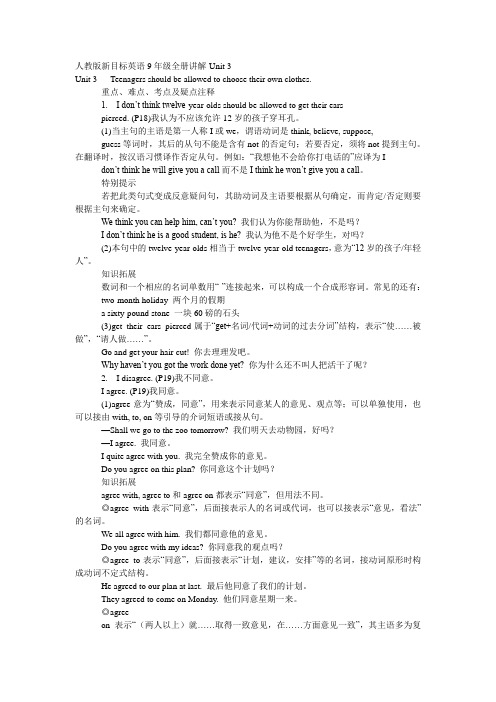
人教版新目标英语9年级全册讲解-Unit 3Unit 3 Teenagers should be allowed to choose their own clothes.重点、难点、考点及疑点注释1. I don’t think twelve-year-olds should be allowed to get their earspierced. (P18)我认为不应该允许12岁的孩子穿耳孔。
(1)当主句的主语是第一人称I或we,谓语动词是think, believe, suppose,guess等词时,其后的从句不能是含有not的否定句;若要否定,须将not提到主句。
在翻译时,按汉语习惯译作否定从句。
例如:“我想他不会给你打电话的”应译为I don’t think he will give you a call而不是I think he won’t give you a call。
特别提示若把此类句式变成反意疑问句,其助动词及主语要根据从句确定,而肯定/否定则要根据主句来确定。
We think you can help him, can’t you? 我们认为你能帮助他,不是吗?I don’t think he is a good student, is he? 我认为他不是个好学生,对吗?(2)本句中的twelve-year-olds相当于twelve-year-old teenagers,意为“12岁的孩子/年轻人”。
知识拓展数词和一个相应的名词单数用“-”连接起来,可以构成一个合成形容词。
常见的还有:two-month holiday 两个月的假期a sixty-pound stone 一块60磅的石头(3)get their ears pierced属于“get+名词/代词+动词的过去分词”结构,表示“使……被做”,“请人做……”。
Go and get your hair cut! 你去理理发吧。
人教版九年级英语上册unit3--4基础知识复习及训练(含答案)

unit3基础知识复习及训练(含答案)基础知识点复习Unit 3 Could you please tell me where the restrooms are?一.重点短语1. turn left/right 向左/右转2. on one‟ s left/right 在某人的左/右边3. go along Main Street 沿着主大街走4. beside the bank 在银行附近5. between....and... 在.......和.......之间6. go to the third floor 去三楼7. pass by=go past 路过,经过8. how to use the right (proper) language 9. be special about.. . 有……独特之处 10. pardon me 请再说一次11. come on 过来;加油12. one one’ s way to... 在去.......的路上13. something to eat一些吃的东西 14. hold one‟ s hand 抓住某人的手15. mail(send) a letter 寄信16. spend time leading in to a request花时间导入一个请求17. in the shopping center 在购物中心 18. any other....其他任何一个...19. in different situations 在不同情况下 20. park one‟ s car 停车21. an underground parking lot地下停车库 22. such as 例如23. thank sb. for doing sth. 为…感谢某人24. look forward to (doing)…期盼…25. meet sb. for the first time 第一次见到某人26. No problem.没问题。
2020年人教版英语九年级 Unit3 单元知识点详解和练习(无答案)
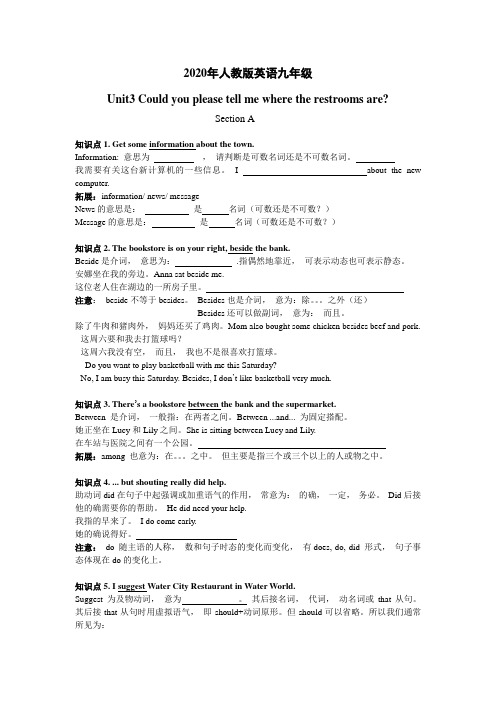
2020年人教版英语九年级Unit3 Could you please tell me where the restrooms are?Section A知识点1. Get some information about the town.Information: 意思为,请判断是可数名词还是不可数名词。
我需要有关这台新计算机的一些信息。
I about the new computer.拓展:information/ news/ messageNews的意思是:是名词(可数还是不可数?)Message的意思是:是名词(可数还是不可数?)知识点2. The bookstore is on your right, beside the bank.Beside是介词,意思为: .指偶然地靠近,可表示动态也可表示静态。
安娜坐在我的旁边。
Anna sat beside me.这位老人住在湖边的一所房子里。
注意:beside不等于besides。
Besides也是介词,意为:除。
之外(还)Besides还可以做副词,意为:而且。
除了牛肉和猪肉外,妈妈还买了鸡肉。
Mom also bought some chicken besides beef and pork. --这周六要和我去打篮球吗?--这周六我没有空,而且,我也不是很喜欢打篮球。
--Do you want to play basketball with me this Saturday?--No, I am busy this Saturday. Besides, I don’t like basketball very much.知识点3. There’s a bookstore between the bank and the supermarket.Between 是介词,一般指:在两者之间。
Between ...and... 为固定搭配。
她正坐在Lucy和Lily之间。
九年级人教版英语unit3知识点讲解
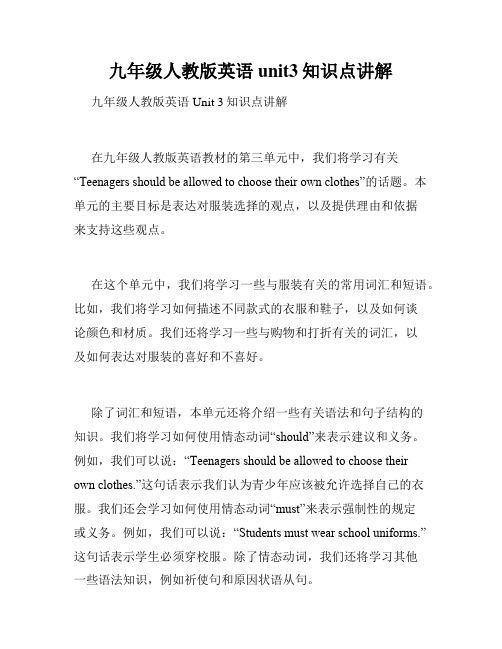
九年级人教版英语unit3知识点讲解九年级人教版英语Unit 3知识点讲解在九年级人教版英语教材的第三单元中,我们将学习有关“Teenagers should be allowed to choose their own clothes”的话题。
本单元的主要目标是表达对服装选择的观点,以及提供理由和依据来支持这些观点。
在这个单元中,我们将学习一些与服装有关的常用词汇和短语。
比如,我们将学习如何描述不同款式的衣服和鞋子,以及如何谈论颜色和材质。
我们还将学习一些与购物和打折有关的词汇,以及如何表达对服装的喜好和不喜好。
除了词汇和短语,本单元还将介绍一些有关语法和句子结构的知识。
我们将学习如何使用情态动词“should”来表示建议和义务。
例如,我们可以说:“Teenagers should be allowed to choose their own clothes.”这句话表示我们认为青少年应该被允许选择自己的衣服。
我们还会学习如何使用情态动词“must”来表示强制性的规定或义务。
例如,我们可以说:“Students must wear school uniforms.”这句话表示学生必须穿校服。
除了情态动词,我们还将学习其他一些语法知识,例如祈使句和原因状语从句。
在本单元中,我们也将学习如何进行听力和口语练习。
我们将听一些关于服装和购物的对话和短文,并回答一些与之相关的问题。
这将有助于提高我们的听力技巧和口语表达能力。
此外,我们还将进行一些角色扮演的练习,扮演不同的角色来表达对服装选择的观点。
学习这个话题不仅可以帮助我们扩展词汇和语法知识,还可以促进我们思考和表达个人观点的能力。
通过探讨服装选择的问题,我们可以思考为什么有些人喜欢流行的衣服,而另一些人喜欢传统的款式。
我们可以讨论服装与个人身份和社会观念之间的关系。
此外,我们还可以思考为什么学校有着对学生着装的规定,以及这些规定背后的原因。
总之,九年级人教版英语教材的第三单元提供了丰富的词汇、语法和口语练习,以及引发思考和讨论的话题。
人教版英语九年级Unit 3 重点知识归纳及讲解

九年级上Unit 3知识清单Section A一、重点短语1. get some magazines/stamps买些杂志/邮票2. a pair of shoes 一双鞋3. ask for the information about the town 询问关于这个小镇的消息4. pass (by) a bookstore = go past/by a bookstore 走过一家书店5.beside the back = next to/ at the side of the bank 在银行旁边6. go to the second floor 去二楼7. get some postcards 买一些卡片8. try the rides 尝试些乘骑项目9. go on sth继续某事10.be excited to do sth兴奋地做某事be excited about sth/doing sth.11. start with = begin with 以...开始end with 以…结束12. hold my hand 抓住我的手13. come on 加油;得了吧14. walk up to 走向15. go east along 沿着…(向东)走16. on one’s way to sp在去某地的路上17. get angry 饿了18. at the door 在门口19. mail a letter 寄封信20. the Italian restaurant nearby 附近的意大利餐馆二、重点句型1. I was scared first, but shouting did help. 该句话中, “did”的用法是助动词表强调,起加强语气的作用。
同类例句如:I’m not joking, we did go camping last weekend. The summer holiday does start next Monday.2. 英语常见问路/指路表达方式:1) 问路Excuse me/Pardon me, where is the nearest post office?Excuse me, which is the way to the nearest post office?Excuse me/Pardon me, can/could you (please) tell me the way to the post office?Excuse me/Pardon me, how can I get to the nearest post office?Could you please possibly tell me how to get to the library?Excuse me/Pardon me, do you know if there’s a post office around here?Would you please tell me if there is a bank nearby?I wonder +…可加以上所有句型。
人教版初中英语初三Unit3知识讲解与练习
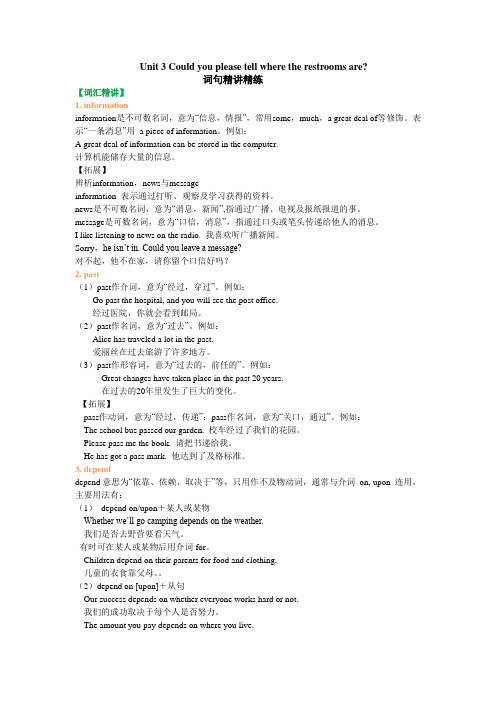
Unit 3 Could you please tell where the restrooms are?词句精讲精练【词汇精讲】1. informationinformation是不可数名词,意为“信息,情报”,常用some,much,a great deal of等修饰。
表示“一条消息”用a piece of information。
例如:A great deal of information can be stored in the computer.计算机能储存大量的信息。
【拓展】辨析information,news与messageinformation 表示通过打听、观察及学习获得的资料。
news是不可数名词,意为“消息,新闻”,指通过广播、电视及报纸报道的事。
message是可数名词,意为“口信,消息”,指通过口头或笔头传递给他人的消息。
I like listening to news on the radio. 我喜欢听广播新闻。
Sorry,he isn’t in. Could you leave a message?对不起,他不在家,请你留个口信好吗?2. past(1)past作介词,意为“经过,穿过”。
例如:Go past the hospital, and you will see the post office.经过医院,你就会看到邮局。
(2)past作名词,意为“过去”。
例如:Alice has traveled a lot in the past.爱丽丝在过去旅游了许多地方。
(3)past作形容词,意为“过去的,前任的”。
例如:Great changes have taken place in the past 20 years.在过去的20年里发生了巨大的变化。
【拓展】pass作动词,意为“经过,传递”;pass作名词,意为“关口,通过”。
例如:The school bus passed our garden. 校车经过了我们的花园。
九年级英语人教版全一册_山西省太原市人教版九年级英语Unit3复习和练习
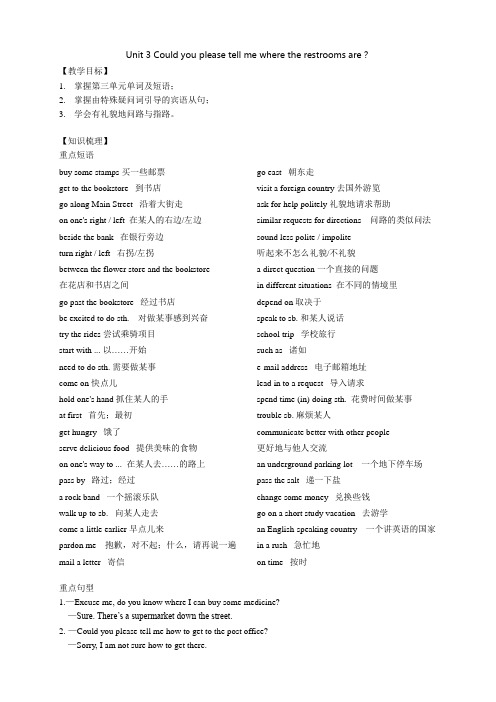
Unit 3 Could you please tell me where the restrooms are?【教学目标】1.掌握第三单元单词及短语;2.掌握由特殊疑问词引导的宾语从句;3.学会有礼貌地问路与指路。
【知识梳理】重点短语buy some stamps 买一些邮票get to the bookstore 到书店go along Main Street 沿着大街走on one's right / left 在某人的右边/左边beside the bank 在银行旁边turn right / left 右拐/左拐between the flower store and the bookstore在花店和书店之间go past the bookstore 经过书店be excited to do sth. 对做某事感到兴奋try the rides 尝试乘骑项目start with ... 以……开始need to do sth. 需要做某事come on 快点儿hold one's hand 抓住某人的手at first 首先;最初get hungry 饿了serve delicious food 提供美味的食物on one's way to ... 在某人去……的路上pass by 路过;经过a rock band 一个摇滚乐队walk up to sb. 向某人走去come a little earlier 早点儿来pardon me 抱歉,对不起;什么,请再说一遍mail a letter 寄信go east 朝东走visit a foreign country 去国外游览ask for help politely 礼貌地请求帮助similar requests for directions 问路的类似问法sound less polite / impolite听起来不怎么礼貌/不礼貌a direct question 一个直接的问题in different situations 在不同的情境里depend on 取决于speak to sb. 和某人说话school trip 学校旅行such as 诸如e-mail address 电子邮箱地址lead in to a request 导入请求spend time (in) doing sth. 花费时间做某事trouble sb. 麻烦某人communicate better with other people更好地与他人交流an underground parking lot 一个地下停车场pass the salt 递一下盐change some money 兑换些钱go on a short study vacation 去游学an English-speaking country 一个讲英语的国家in a rush 急忙地on time 按时重点句型1.—Excuse me, do you know where I can buy some medicine?—Sure. There’s a supermarket down the street. 2.—Could you please tell me how to get to the post office?—Sorry, I am not sure how to get there.3.—Can you tell us when the band starts playing this evening?—It starts at 8:00 p.m.4.—I wonder where we should go.—You should try that new ride over there.问路的常用英语表达:1.Excuse me, can you tell me where the railway station is?打扰一下,请问火车站在哪儿?2.Excuse me, but can you tell me the way to the train station?劳驾,请问去火车站怎么走?3.Excuse me, could you tell me which is the way to the nearest hospital?劳驾,请问去最近的医院怎么走?4.Excuse me, would you please show me the way to the post office?请告诉我去邮局怎么走好吗?5.Excuse me, would you mind telling me the way to the police station?劳驾,请告诉我去警察局怎么走好吗?6.Excuse me, how can I get to No. 1 Middle School?劳驾,请问去一中怎么走?7.Excuse me, is this the right way to the People’s Park?打扰了,请问去人民公园走这条路对吗?8.Excuse me. Could you tell me if there is a Qiaotou Middle School near here?打扰了,请问桥头中学是否在这附近?9. Excuse me. Do you know how I can get to Qiaotou Middle School?= Excuse me. Do you know how to get to Qiaotou Middle School?请问,你知道怎样去桥头中学吗?指路的常用英语表达:1.Go along this street, and …is o n your left.2.Go down this way, and turn left at the first crossing, and you’ll find …is right there, on your left.3.…is behind (near, next to, on the left of) …4.You can just take No. 111 bus, and get off at the second station. And you’ll see it.5.Look! …is in front of us far away, right there!注意:1.问路时应首先说一声:“Excuse me.”这样可以引起对方的注意,又不失礼貌。
人教版九年级英语全册Unit3同步练习(包含答案)
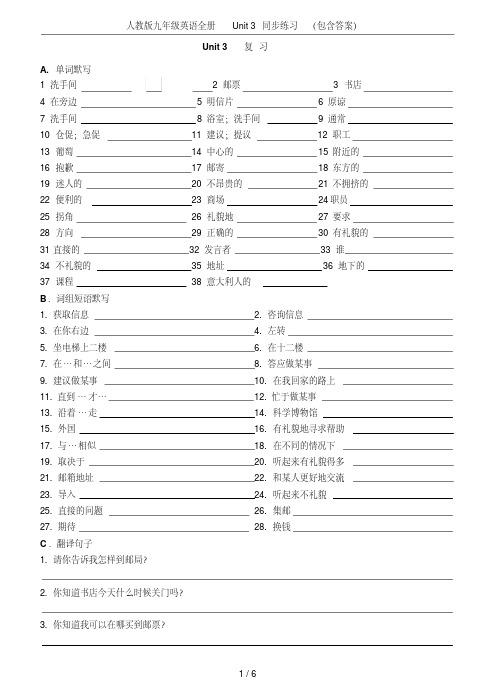
人教版九年级英语全册Unit 3 同步练习(包含答案)
Unit 3 复习
A. 单词默写
1 洗手间
2 邮票
3 书店
4 在旁边
5 明信片
6 原谅
7 洗手间8 浴室;洗手间9 通常
10 仓促;急促11 建议;提议12 职工
13 葡萄14 中心的15 附近的16 抱歉17 邮寄18 东方的19 迷人的20 不昂贵的21 不拥挤的22 便利的23 商场24职员
25 拐角26 礼貌地27 要求
28 方向29 正确的30 有礼貌的31直接的32 发言者33 谁
34 不礼貌的35 地址36 地下的37 课程38 意大利人的
B.词组短语默写
1. 获取信息
2. 咨询信息
3. 在你右边
4. 左转
5. 坐电梯上二楼
6. 在十二楼
7. 在…和…之间8. 答应做某事
9. 建议做某事10. 在我回家的路上
11. 直到…才…12. 忙于做某事
13. 沿着…走14. 科学博物馆
15. 外国16. 有礼貌地寻求帮助
17. 与…相似18. 在不同的情况下
19. 取决于20. 听起来有礼貌得多
21. 邮箱地址22. 和某人更好地交流
23. 导入24. 听起来不礼貌
25. 直接的问题26. 集邮
27. 期待28. 换钱
C.翻译句子
1. 请你告诉我怎样到邮局?
2. 你知道书店今天什么时候关门吗?
3. 你知道我可以在哪买到邮票?
1 / 6。
Unit3重点知识讲解与练习人教版新目标英语九年级全一册

人教版新目标九年级英语Unit3 Could you please tell me where the restrooms are?重点知识讲解与练习I.词组1. a pair of 一双/一条/一副…2.get to…到达…3.be able to +v 能够做某事4.how about/what about (询问对方情况)…怎么样?5.at first 开始;起初6. a staff person 职员;工作人员7.at that time 那时候8. one /one’ s way to... 在去.......的路上9. something to eat吃的东西10. pass by=go past 路过,经过11. in different situations 在不同情况下12. some+单数可数名词某一…13.. between....and... 在.......和.......之间14.. such as 例如,诸如15.. thank sb. for (doing)sth. 感谢某人做谋事16. look forward to+Ving…期盼做谋事…17. for the first time 第一次18. start/ begin with从/…开始19.ask for information 寻求信息20. at the corner of 在.......的角落21.on/at the corner 在拐角处22..on time 准时按时23..lead into 导入引入24.each other 相互25.cver there 那儿26 .walk up to 朝.....走去27.would like//want . 想要….28 .ask/ (sb.) about sth. 询问(某人)某事的情况municate …with…. 与…联系/沟通30.. an underground parking lot地下停车场二.重点句型\语法1..Could you please…? “请你……好吗?”. 表示有礼貌的提出请求,后接动词原形。
人教版九年级英语Unit3课时练习及答案

Unit 3 Could you please tell me wherethe restrooms are?第 1 课时Section A 1a-1c1.一、根据提示, 用本课时的词汇完成句子。
2.You can wash your hands in the r over there.3.Many people want to the b to buy books.4.I need get a s to mail my letter.5.Jim is sitting (在……旁边)me.1.二、根据汉语, 完成句子。
你能告诉我在哪买一些邮票吗?Could you tell me where I can ?2.这个银行在主街上。
The bank is .3.在街另一边你能看到一家邮政局。
You can see a post officethe street.三、单项填空( )1.Just walk down this road and you’ll see the museum yourright.A.onB.inC.atD.by( )2.Could you please TV now? I’m studying for my test.A.not watchB.not to watchC.don’t watchD.can’t watch ( )3.—Couldyou please pass me the dictionary?—.A.Yes, I couldB.Sure, here you areC.No, I couldn’tD.No, that’s no problem( )4.—Excuse me, would you please tell me t he nearest post office?—Certainly.Walk across the road and turn right, and you’ll see it.A.when can I get toB.when I can get toC.how can I get toD.how I can get to( )5.—Excuse me, could you tell me there is a bookstore aroundhere?—Sure.Just go along Center Street and turn left at the crossing.Then walk downMain Street, you can find one on the right.It’s beside the bank.A.thatB.ifC.howD.what第 2 课时Section A 2a-2d1.一、根据提示, 用本课时的词汇完成句子。
人教版九年级英语Unit3单元练习含答案
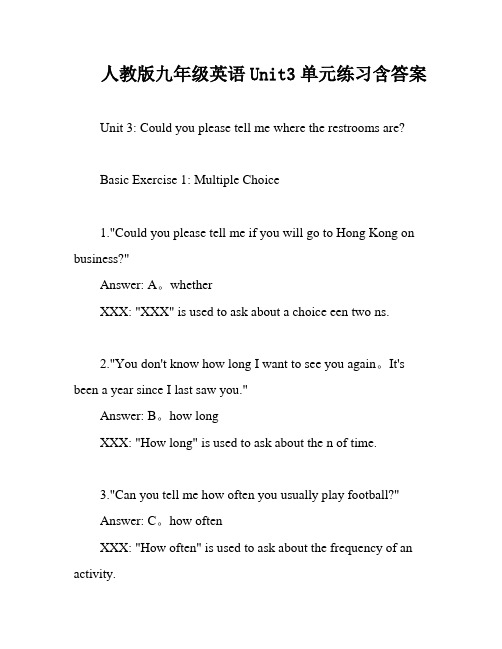
人教版九年级英语Unit3单元练习含答案Unit 3: Could you please tell me where the restrooms are?Basic Exercise 1: Multiple Choice1."Could you please tell me if you will go to Hong Kong on business?"Answer: A。
whetherXXX: "XXX" is used to ask about a choice een two ns.2."You don't know how long I want to see you again。
It's been a year since I last saw you."Answer: B。
how longXXX: "How long" is used to ask about the n of time.3."Can you tell me how often you usually play football?"Answer: C。
how oftenXXX: "How often" is used to ask about the frequency of an activity.4."Lily said she will buy a new piano the next day."Answer: B。
will buyXXX: "Will buy" is used to talk about a future n.5."I want to know when we should arrive at the airport."Answer: A。
人教版九年级unit3英语宾语从句语法专题讲解

时态、
C.what he said
D.what did he say
6、 —Could you please tell me __C__ ?
语序
—Sorry, you can turn to Mr.Lee for help.(2011湖北黄冈)
A.how long can man live without water
C.when arrives the train D.the train when arrives 语序
1、You must remember__A__.(2002)
语序
A.What your teacher said B.What did your teacher say
C.Your teacher said what D.What has your teacher said
B.where you live
语序
C.where are you living
D.where are you live
15、Could you tell me __B__ ?(2011北京市崇文区)
A.when does the train arrive B.when the train arrives
13、—Could you tell me __C__?
—It's twenty minutes by underground.(2011江引苏导泰词州、)
A.how can I get to your school
语序
B.how much it costs to get to your school
B.the post office was
D.was the post office
人教版九年级英语Unit3 Section A Grammar Focus(课文讲解+练习)

— Yesterday morning.
A. where they arrived
B. when they arrived in Beijing
C. when did they arrive in Beijing D. where did they arrive
A. where did you buy it
B. why did you buy it
C. where you bought it
D. why you bought it
语法专练
单项填空。
1 Could you say it again? I can’t understand ______ you are
Unit 3
Could you please tell me where the restrooms are?
Grammar Focus
疑问词引导的宾语从句
语法讲解
1 当宾语从句由特殊疑问句充当时,用who, what, whom, whose, which, when, where, why, how等作为引导词。如: What did Mary say? I want to know. → I want to know what Mary said. 我想知道玛丽说了什么。 How many hours does a teenager need to sleep every day? Do you know? → Do you know how many hours a teenager needs to sleep every day? 你知道一个青少年每天需要睡多少小时吗? Why is eating too much salt bad for us? Can you tell me? → Can you tell me why eating too much salt is bad for us? 你能告诉我为什么吃太多盐对我们有害吗?
人教版九年级英语Unit3 重点短语、句子、知识点和语法练习(无答案)
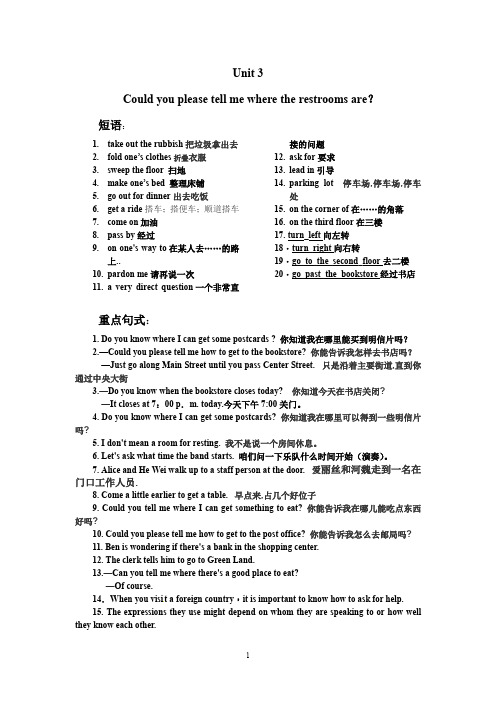
Unit 3Could you please tell me where the restrooms are?短语:1.take out the rubbish把垃圾拿出去2.fold one’s clothes折叠衣服3.sweep the floor 扫地4.make one’s bed 整理床铺5.go out for dinner出去吃饭6.get a ride搭车;搭便车;顺道搭车e on加油8.pass by经过9.on one's way to在某人去……的路上..10.pardon me请再说一次11.a very direct question一个非常直接的问题12.ask for要求13.lead in引导14.parking lot 停车场,停车场,停车处15.on the corner of在……的角落16.on the third floor在三楼17. turn_left向左转18.turn_right向右转19.go_to_the_second_floor去二楼20.go_past_the_bookstore经过书店重点句式:1. Do you know where I can get some postcards ? 你知道我在哪里能买到明信片吗?2.—Could you please tell me how to get to the bookstore? 你能告诉我怎样去书店吗?—Just go along Main Street until you pass Center Street.只是沿着主要街道,直到你通过中央大街3.—Do you know when the bookstore closes today? 你知道今天在书店关闭?—It closes at 7:00 p.m. today.今天下午7:00关门。
4. Do you know where I can get some postcards? 你知道我在哪里可以得到一些明信片吗?5. I don't mean a room for resting. 我不是说一个房间休息。
人教版九年级英语Unit3知识点梳理及语法讲义(学生版)

九年级英语Unit 3知识点与语法精讲精练词汇梳理(一)完成单词梳理:名词:1. 书店 2. (美)洗手间 3. 邮票;印章4. 明信片5. 洗手间6. 浴室;洗手间7. 职工8. 葡萄9. 商场;购物中心10. 职员11. 拐角;角落12. 方向;方位13. 住址;地址14. 课程;学科15. 发言者动词:1. 建议;提议代词:1. 谁;什么人副词:1. 通常;正常情况下 2. 礼貌地;客气地介词:1. 在……旁边;在……附近形容词:1. 中心的;中央的 2. 迷人的;极有吸引力的3. 不昂贵的4. 不拥挤的;人少的5. 便利的;方便的6. 正确的;恰当的7. 有礼貌的;客气的8. 直接的;直率的9. 不礼貌的;粗鲁的兼类词:1. (v)原谅(interj)请再说一遍 2. (n/v)仓促;急促3. (adj)附近的;邻近的(adv)在附近;附近4. (v)邮寄;发电子邮件(n)邮件;信件5. (adj)东方的;东部的(adv)向东;朝东(n)东;东方6. (n/v)要求;请求7. (adj)地下的(n)地铁8. (adj)意大利(人)的(n)意大利人;意大利语(二) 词汇变形小结:1. normal (adj. 正常的) — (adv. 通常;正常情况下)2. suggest (v. 建议;提议) — (n. 建议)3. center (n. 中心) — (adj. 中心的;中央的)4. east (n. 东;东方) — (adj. 东方的)5. expensive (adj. 昂贵的) — ()6. crowd (n. 人群) — (adj. 拥挤的) — (adj. 不拥挤的)7. convenient (adj. 便利的;方便的) — (反义词:不方便的)— (n. 方便)8.polite (adj. 礼貌的) — (反义词:不礼貌的) — (adv. 礼貌地)— (反义词:不礼貌地)9. direct (adj. 直接的;直率的) — (反义词:间接的) — (adv. 直接地) direct(v. 指路;导演)— (n. 方向) — (n. 导演)10. correct(adj. 正确的) — (反义词:不正确的) — (adv. 正确地)11. speak(v. 说)— (n. 发言者)12. whom(pron. 谁,宾格)— (主格) — (pron. 谁的)13. Italy(n. 意大利) — (adj. 意大利的)【练一练】用所给词的适当形式填空1.The bus is too __________ (crowd). Let’s take the next one.2.Can you draw the ___________ (direct) from your school to your home?3.If we see someone breaking the rules, we may __________ (polite) give them some suggestions.4.It’s more __________ (convenience) to take the subway to the station than walk.5.The supermarket is in the ___________ (center) part of the city.6.It is not enough to just ask a question ____________ (correct).7.Could you please give me some___________ (suggest)about studying English?8.My cousin likes to collect ________ in his spare time. (stamp)9.There are only two ________ (postman) in the post office now.10. It’s __________ (polite) to stare at anyone or to talk loudly in public.(三) 短语攻关:抱歉;对不起;请再说一遍一双/ 路过;经过沿着……走快点儿;加油走向停车场在那时建议做某事在某人去…的路上在某人的右边彼此;相互导入;引入与……交流首次对某人说购物中心准时;按时盼望做某事做某事很兴奋知识点梳理1.Could you please tell me where the restrooms are? 请问你能告诉我洗手间在哪里吗?【用法详解】Could you please...? 该句型意为“请你……好吗?”,用于礼貌地提出请求,please后接动词原形。
新人教版九年级英语第三单元知识点讲解与练习含答案

九年级英语Unit31.语态:①英语有两种语态:主动语态和补动语态主动语态表示是动作的执行者被动语态表示主语是动作的承受者Cats eat fish. (主动语态)猫吃鱼。
Fish is eaten by cats.(被动语态)鱼被猫吃。
②被动语态的构成由“助动词be +及物动词的过去分词”构成助动词be 有人称、数和时态的变化,其变化规则与be 作为连系动词时完全一样。
时态被动语态结构例句一般现在时amare +过去分词isEnglish is spoken in manycountries.一般过去时was +过去分词were + 过去分词This bridge was built in1989.情态动词can/shouldmay +be+过去分词must/……The work must be doneright now.③被动语态的用法当我们不知道谁是动作的执行者,或者没有必要指出谁是动作的执行者,或者只需强调动作的承受者时,要用被动语态。
2. allow sb. to do sth. 允许某人做某事(主动语态)如:Mother allows me to watch TV every night. 妈妈允许我每晚看电视。
be allowed to do sth.被允许做某事(被动语态)如:LiLy is allowed to go to Qinzhou. 莉莉被允许去钦州。
3. get their ears pierced 穿耳洞让/使(别人)做某事 get sth. done(过去分词)have sth. done如:I get my car made. == I have my car made. 我让别人修好我的车4. enough 足够形容词+enough如:beautiful enough足够漂亮enough+名词如:enough food 足够食物enough to 足够…去做…如:I have enough money to go to Beijing. 我有足够的钱去北京。
Unit3单词讲解及练习人教版九年级英语全册

第三单元单词讲解1.restroom n. (美)洗手间;公共厕所2.Washroom n. 洗手间;厕所3.Bathroom n. 浴室;洗手间4.Stamp 邮票;印章stamp collection集邮5.Bookstore n. 书店6.Beside prep. 在...旁边=by beside the lake=by the lake在湖的旁边7.Besides prep. 除...之外(还有)... Li Ming went home besides me. 除了我之外,李明也回家了。
8.Postcard n. 明信片9.Pardon v. 原谅;intery. 请再说一遍10.Pardon me 抱歉;对不起;什么;请再说一遍11.Normal adj. 普遍的;一般的;正常的normally adv.通常;正常情况下12.Rush v./n.仓促;急促rush to do sth.匆忙干某事rush into冲进in a rush匆忙地13.Suggest v.建议;提议suggestion n. 建议;提议(可数)some suggestions一些建议Suggest (one’s) doing sth.建议(某人)干某事14.advise v. 建议advice n. 建议(不可数名词)Advise sb to do sth.建议某人干某事some advice一些建议15.pass by=walk by=go by=go past=walk past 路过;经过16.Staff n. 管理人员;职工指“工作人员”总称时。
是集合名词,不用变复数,本来就是复数;也可强调个别成员,作主语是单三,也可变成复数。
17.Clerk n.职员(可数)18.Grape n. 葡萄19.Centre/center n. 中心;中央central adj.中心的;中央的the centre of... ...的中心20.Nearby adj.附近的;邻近的;adv.在附近;附近= near here/around here/in the neighborhood21.mail v. 邮寄;发电子邮件n. 邮件;信件Email sb at+邮箱地址给某人发邮件22.East 东south 南west 西north北方位名词加后缀+ern 变成形容词23.fascinating adj.迷人的;极有吸引力的24.Expensive adj. 昂贵的否定词inexpensive 不昂贵的25.Crowd v.拥挤n. 群众;人群crowded adj.拥挤的be crowded with...挤满...26.Uncrowded 不拥挤的;人少的27.Convenient adj. Convenience 便利;方便inconvenient 不便利的Be convenient to do sth干某事是便利的28.mall n. 商场;购物中心in the mall在商场29.Corner n. 拐角;角落at the corner在拐角处in the corner在拐角里on the corner在拐角上30.polite adj.礼貌的be polite to sb对某人有礼貌politely adv.礼貌地more polite31.Impolite adj.没有礼貌的;粗鲁的32.Request n./v.要求;请求request sb to do sth要求某人干某事request sth from sb向某人要求某物request for sth要求某事make requests提出要求33.Direct v.指向direction n. 方向;方位in the direction of...朝着...的方向director导演Adj.直接的;直率的directly adv.直接地;直率地34.Correct adj.正确的;恰当的correctly adv. 恰当地;适当地=properly35.Speak n. 说;讲speaker 发言者36.Who 谁whom谁(宾格)做宾语时用37.Address n.住址;地址;通讯处What’s your address?你的地址是什么38.Underground adj.地下的n. 地铁39.Parking lot 停车场;停车区40.Course n.课程;学科41.Italy 意大利Italian 意大利(人)的;意大利人;意大利语第三单元单词讲解练习1._____________ n.洗手间;公共厕所2.____________ 邮票;印章____________集邮3.____________ n. 书店4.____________ prep. 在...旁边=by ____________在湖的旁边5.____________ prep. 除...之外(还有)... ____________ 除…之外6.____________ n. 明信片7.____________ 抱歉;对不起;什么;请再说一遍8.____________ adj. 普遍的;一般的;正常的____________ adv.通常;正常情况下9.____________ v./n.仓促;急促10.____________ v.建议;提议____________ n. 建议;提议(可数)____________一些建议____________建议干某事11.____________ v. 建议____________ n. 建议(不可数名词)____________建议某人干某事____________一些建议12.____________ 路过;经过13.____________ n. 管理人员;职工指“工作人员”总称时。
人教版九年级全册英语Unit3 SectionA 知识讲解+专题练习学案(含答案)

Unit3 SectionA知识讲解1. a pair of 一双、一幅、一对a pair of用来表示"一对""一双""一副"等概念,常用于相同的两样东西成对出现或分为两个部分又彼此连接的物体名词前,该名词要用复数形式。
2. Excuse me, could you please tell me how to get to the bookstore? 打扰一下,你能告诉我到书店怎么走吗?(1)本句是问路或问处所的常用句型,此处excuse me用以礼貌地引起他人的注意,也表示尊重对方。
(2)Could you please...?意为"请你……好吗?",用于有礼貌地提出请求,语气较委婉,其后跟动词原形。
若是肯定回答Sure./Certainly./With pleasure./No problem.等;若是否定回答则用No, I can’t./I’m afraid not.等。
3. go pastgo past意为"经过,路过",相当于pass。
其中past为介词,意为"从……旁边过去"。
(1)past用作介词,还表示"(时间)超过;晚于"。
(2)past用作副词,意为"经过,过去"。
(3)past用作形容词,意为"过去的"。
4. suggest v.建议;提议suggest sth. (to sb.)(向某人)提议/建议某事suggest doing sth. 建议做某事suggest + that引导的宾语从句建议……此时宾语从句要用虚拟语气,谓语动词用(should)+ 动词原形suggest的名词形式为suggestion,意为"建议;提议"。
5. on one’s way to…意为"在某人去……的路上"。
by the way顺便说一下;顺便问一下in a way在某种程度上lose one’s way 迷路in the way挡路;妨碍(某人)in this way这样;通过这种方法专题练习一、单项选择1.Can you please tell me where ________ the post office?A.to find B.can I find C.how to find2.— I hear we’ll have a new English teacher this term.— Really? Do you know ______?A.what subject he teaches B.where he comes fromC.if he is a math teacher D.why he teaches so well3.________, which is the nearest way to Hill Building?A.Sorry B.Hello C.Excuse me D.Thank you 4.Could you tell me ________?A.where can I put the bicycle B.where could I put the bicycle C.where I can put the bicycle D.where I could put the bicycle5.We are all excited ________ the good news.A.listen to B.hear C.to listen to D.to hear二、完型填空A couple from Russia was once visiting Miami. They wanted to take a walk and to see the city, but they were 6 they might get lost. They did not speak any English.After they left their hotel, they went to the first street corner and 7 the name of the street. Then they carefully copied the name into their 8 . They thought that this would help them find their way back 9 they got lost.They walked for hours through the city, and suddenly they 10 that they were lost. They found a police officer and asked for 11 , but the officer didn’t speak their native language. They couldn’t 12 each other.After an hour they found a person who could help them. She was an interpreter(口译译员) who spoke both their native language and 13 . They explained that they didn’t know the name of their hotel, but they knew which corner it was on. They showed the interpreter what they had copied into their notebook, and the interpreter began to 14 .The words which they had so carefully copied 15 “one way street”. 6.A.sure B.afraid C.surprised D.careful 7.A.looked at B.wrote down C.talked about D.put up 8.A.bag B.phone C.notebook D.computer 9.A.unless B.if C.because D.whether10.A.decided B.understood C.realized D.wondered 11.A.money B.address C.help D.paper 12.A.understand B.teach C.learn D.control 13.A.Russian B.English C.French D.Chinese 14.A.point B.cry C.shout D.laugh 15.A.is B.were C.was D.are三、阅读单选Every English learner needs to know how to ask for something in English. There are a number of ways to do this. If you know someone has something, you can ask for it with a polite question. If you don’t know, it’s possible to ask for something with a yes or no question. Be careful not to use the direct expressions. In other words, don’t say “Give me that”, but ask kindly as the following examples, “Do you have a pen I could borrow?” “Is there any wine?” “Did you buy any bread?”If you know or see someone has something, ask a polite question with “could”, “may” or “might”. It’s also possible to use “can” in some special situations. In the past, “can” was not used when people asked for something, but meant ability. In the UK, people mainly use “Can you lend me…?” or “Can I have…?” In the US, this is still considered to be wrong and “May I have…?” is preferred.It’s common to use “Could you lend/hand/give…?” You can also use: “May/Can I borrow…?” “Could/Can you lend me…?” “May I have…?” “Could you hand/give me…?” Do not begin a sentence with “please”, but you can add “please” at the end of the sentence to be polite.16.What can we ask if we know someone has something?A.A direct question.B.A no question.C.A yes question.D.A polite question.17.What can Lucy say politely if she wants some coffee?A.Pass me some coffee.B.Is there any coffee?C.Give me some coffee.D.Take some coffee to me.18.What didn’t people say when they wanted something politely in the past?A.Can I use your dictionary?B.Could you lend me your bike?C.May I try your computer now?D.Might I take your car today?19.Which of the following is a correct polite expression according to the passage? A.Do you give me any milk, please?B.Please could you lend me your ruler?C.May I have some tea, please?D.Please could you hand me a knife?20.What’s the main idea of the passage?A.How to express or ask politely.B.What to do when we are polite.C.How to describe our ideas.D.What to do with our language problems.四、用所给单词的正确形式填空用括号内所给单词的适当形式填空21.Many people are exercising in __________(center)Park.22.Could you please __________(turn)down the radio?23.Tom __________(do)come early yesterday.24.He has finished __________(mail)a letter.25.This kind of animal __________(normal)comes out at night.五、完成句子26.这次考试他比上次考得甚至更好。
人教版九年级英语上册Unit3练习题

人教版九年级英语上册Unit3练习题练习是为了更好的巩固好所学知识点,关于人教版九年级英语上册Unit3的练习题同学们要如何完成呢?接下来是店铺为大家带来的关于人教版九年级英语上册Unit3练习题,希望会给大家带来帮助。
人教版九年级英语上册Unit3练习题:一、根据句意及汉语提示完成单词1.Could you tell me where the ________________(厕所) is?2.I received a ________________ (明信片)from my pen pal.3.The sun rises in the ________(东方).4.The new city library is __________(在旁边) a qu iet park.(温州)5.The lit tle boy likes collecting ________(邮票)in his spare time.6.Some people are used to sending their relatives and friends SMSmessag es instead of ________ (明信片).7.There are ________ (厕所) at the end of the hallway.8.Study is not a thing to be done in a ________ (急促).二、根据句意及首字母提示完成单词9.Jim is taking a shower in the b________.10.I beg your p________; what did you mean?11.There is a bank b________ the supermarket.三、用所给词的适当形式填空12.How many ________(stamp) do you want to buy?1 3.I forgot ________(mail) the letter to him. I will do it at once.14.When do you ________(no rmal) get home from work?四、用方框中所给单词或短语的适当形式填空between... and...,pardon, rush15.—Can you help me carry the box?—________?16.Th ere is a beautiful garden ________ the post office ________ the theatre.17.Tom __ ______ to school,only to find that he had already beenlate.五、同义句转换18.She went past me when I sat on the ground in the park.She ________ ________ me when I sat on the ground in the park.19.I don't know what I shall do next.I don't know ________ ________ ________ next.20.Excuse me. Can you tell me where I can park the car?________ ________. Can you tell me where I can park the car?21.Could you please tell me whether there is a post office nearby?Could you please tell me ________ there is a post office nearby? 人教版九年级英语上册Unit3练习题答案:一、1.restroom 2.postcard 3.east 4.beside 5.stamps6.pos tcards7.restrooms8.Rush二、9.bathroom10.pardon 点拨:本题用语境联想法解题。
Unit3讲义 人教版英语九年级全册

Unit3 Could you please tell me where the the restrooms are? 1.Go past the bookstore.past(prep)通过辨析: past与passpast:(adj)过去的;前任的(adv/prep)经过;超过(n)过去;往事pass:(v)经过;穿过;(考试等)合格(n)及格;通行证;传球辨析:past,over,across与throughpast:超过;从...旁边经过表示时间上的“超过”/空间上的“经过”over:从...上方跨越而过表示动作发生在物体的上方across:横穿;越过表示动作是在某一物体的表面进行的强调从一端到另一端through:穿过;越过表示动作是在某一空间内进行的,强调从内部穿过2.I suggest Water City Restaurant in Water World.suggest(v)建议;提议suggestion (cn) 建议用法如下:suggest sth.建议某事suggest doing sth.建议做某事suggest (that) sb.do sth. 建议某人做某事Eg: I suggest a walk after dinner.She suggests (that) he go to see a doctor.辨析: advise与suggest共同点:两者都可接宾语从句advise: ~ sb.(not) to do sth. 建议某人(不要)做某事suggest:~sb./sb’s doing sth. 建议某人做某事Eg:I advise my father to stop smoking.I suggest my father/father’s stopping smoking.3.Is the Italian restaurant nearby open on Mondays?辨析:near与nearbynear与nearby都可作adj/adv①near:通常指时间、空间、年龄、程度等的接近,有比较级和最高级,作adj通常放在n之前Eg: A brother is a near relation.兄弟是近亲.Christmas is near.②nearby:通常指空间上的接近Eg: The helicopter landed nearby.③作adv时,多用nearby,如果用near,其前通常要有修饰词.Eg: They live nearby.They live quite near.4.These are similar requests for directions.①request(cn)要求;请求短语: make a ~ (for) 请求at one’s request 应某人的要求②request(vt)要求;请求用法如下:1.~sth.(from sb.) (向某人) 请求某事/某物Eg:The boy requests some hot water from me.2.~sb.to do sth. 请求某人做某事3.request that+从句(从句用虚拟语气:should+v,should可以省略) 意为:请求...Eg:I requested that she (should) come an hour earlier.5.That is because it is a very direct question.分析句子: 句中的because it is a very direct question作表语,此类句子称为表语从句.表语从句常用连词:that,what,who,when,where,how 等引导,位于连系动词的后面.Eg: The question is who will go there with him.The problem is when we will start the plan.6.It might seem more difficult to speak politely than directly.seem(系动词) 看起来;好像;似乎用法如下:①seem+to do / ~to be 似乎;好像Eg: The baby seems to be asleep.②~+n/adj 看上去好像...Eg:She seems quite shy.③It seems/seemed +that 似乎;好像...Eg:It seemed that no one knew what happened.④seem like+n 好像...Eg:It seems like a good idea.⑤there be中含seem的结构为:There seems to be... 似乎;好像Wh- 疑问词引导的宾语从句宾语从句在复合句中作主句的宾语,连接宾语从句的有从属连词、连接代词、连接副词三种从属连词that(不担任成分、可省略);whether/if(担任成分、不可省略) 连接代词who/whom/whose/what/which (除了在句中起连接作用外,还可在句中担任成分,作主语、宾语、定语)连接副词when/where/how/why (除了在句中起连接作用外,还可在句中担任成分,作状语)Eg: You must take back what you said. (连接代词,作宾语)Could you tell me who he is? (连接代词,作表语)I want to know when the plan will take off. (连接词,作时间状语)Our teacher asked me why I was late. (连接词,作原因状语)含有宾语从句的复合句与简单句的转换①若主句的主语或宾语与从句的主语一致,则由疑问词引导的宾语从句可转换成“疑问词+不定式”结构Eg: I don’t know how I should do it next.I don’t know how to do it.②当主句的谓语是see,hear,watch等,其后由that引导的宾语从句常简化为“宾语+动原/v-ing形式”Eg: I saw (that) some boys were playing basketball .I saw some boys playing basketball .。
- 1、下载文档前请自行甄别文档内容的完整性,平台不提供额外的编辑、内容补充、找答案等附加服务。
- 2、"仅部分预览"的文档,不可在线预览部分如存在完整性等问题,可反馈申请退款(可完整预览的文档不适用该条件!)。
- 3、如文档侵犯您的权益,请联系客服反馈,我们会尽快为您处理(人工客服工作时间:9:00-18:30)。
Unit3 Could you please tell me where the restrooms are?Section A1.pardon interj.原文重现:______________________________________________________________________ 仿写句子:______________________________________________________________________ 2.quick adj. & adv.原文重现:______________________________________________________________________ 仿写句子:______________________________________________________________________ 3.rush v. & n.原文重现:______________________________________________________________________ 仿写句子:______________________________________________________________________ 4.suggest v.原文重现:______________________________________________________________________ 仿写句子:______________________________________________________________________ 5.central adj.原文重现:______________________________________________________________________ 仿写句子:______________________________________________________________________ 6.on one’s right / left原文重现:______________________________________________________________________ 仿写句子:______________________________________________________________________ 7.amusement park原文重现:______________________________________________________________________ 仿写句子:______________________________________________________________________ 8.be excited to do原文重现:______________________________________________________________________ 仿写句子:______________________________________________________________________ 9.pass by原文重现:______________________________________________________________________ 仿写句子:______________________________________________________________________ 10.on one’s way to原文重现:______________________________________________________________________ 仿写句子:______________________________________________________________________ 11.turn right / left原文重现:______________________________________________________________________ 仿写句子:______________________________________________________________________1.pardon interj. 请再说一遍,抱歉,对不起表示道歉(比I am sorry.更加正式,也说Pardon me),意为“对不起”。
如:---Ibeg your pardon, I suppose I should have knocked.对不起,想我本来应该敲门的。
--- That’s quite all right.没关系。
拓展:表示没听清或没听懂对方的话,请对方再说一遍(也说Beg your pardon. / Beg pardon./ Pardon.等。
注意用升调),意为“请再说一遍,对不起,我没听清”。
如:--- Where is the post office?邮局在哪里?--- I beg your pardon?请问,你说什么?2.rush v.&n. 仓促;急促Don’t rush to a conclusion. 不要急于下结论。
It was a bit of a rush to get the job done in two hours. 两小时完成这项工作有点儿仓促。
拓展:rush 还可以作不及物动词,意为“冲;奔;闯”。
He rushed into the room. 他冲进了房间。
Linda rushed to hand in her papers. 琳达仓促地交上了试卷。
3.suggest v. 建议,提议suggest 的后面可接名词作宾语,也可接动名词做宾语,也可以接that引导的宾语从句,但that从句的谓语动词用“should+动词原形”,should可以省略。
She suggested an early start. 她建议早一点出发。
They suggested waiting until the proper time. 他们建议(我们)等到恰当的时机才行动。
She suggested that the class meeting (should) not be held on Saturday.她建议班会不要在周六举行。
4.a room for resting用来休息的房间类似的短语我们还学过:a recipe for turkey做火鸡的食谱the instructions for making salad做沙拉的说明5.on their way to---等同于on the way to 在------的途中;在还未到达------时On the way to the station, I bought some chocolate.在去车站的路上,我买了些巧克力。
拓展:有关way的短语还有:lose one’s way 迷路;all the way 完全地,自始至终;by the way顺便说一句;in the way在某种程度上in one’s(own)way以自己的方式;in the way(of)挡道,妨碍;no way不行,没门儿6.pass by 经过,走过by为介词。
还可以说go byWe waited for them to go by.我们等他们过去。
7.Uncle Bob’s名词所有格,意为“鲍勃叔叔的餐馆”拓展:在英文中,所有格后面表示店铺、诊所、餐馆和家等的名词经常被省略。
eg:the butter’s肉铺;the tailor’s 裁缝店;the barber’s 理发店;the doctor’s诊所I’m going to my sister’s for dinner this evening.今晚我要去我姐姐家吃法。
I. 根据句意及首字母提示完成句子。
1. I went into the shop and saw the s________ busy working there.2.I sent some m________ to my friends and now I’m waiting for them to write back to me..3.“Could you please buy some salt for me on your w_______ home?”, asked my mom .4.----I’m hungry, shall we have dinner now?----Sure,here’re two restaurants nearby, which one do you s_____________?5. Japan is to the e________ of China.6.When I p________ by the park, Jim was playing there.7.The kids r_______ out of the school gate when school was over.8.Where can we buy some g___________ or some other fruits?9.More and more people are using e-mails now, so s__________ are less used.10.My cousin sent me a beautiful p___________ from Hong Kong.II. 用所给词的适当形式填空。
1.You can buy what you need on the ___________(four) floor.2.The little girl is always ____________(exciting) whenever she wears beautiful skirts.3.The Internet is now more and more ________________(common) used in any way.4.Do I need ____________(finish) it today?5.Be __________! Time is up, we must go there __________ now.(quick)1.Excuse me, could you please tell me how to get to the bookstore?打扰了,你能告诉我如何去书店么?这是问路的常用句型。
